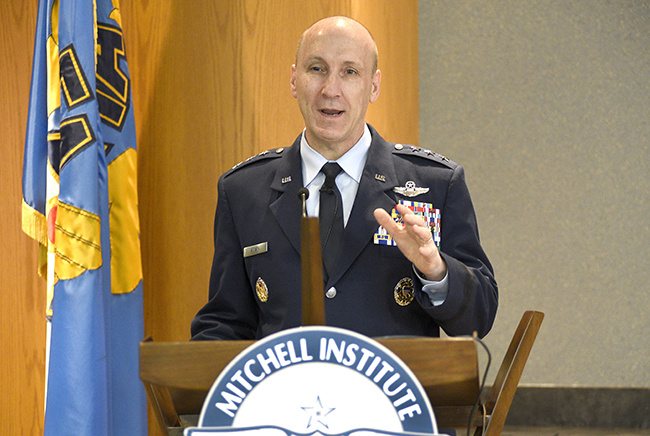
Lt. Gen. David Allvin, the director of strategy, plans, and policy for the Joint Staff, speaks at an AFA Mitchell Institute event in Arlington, Va., on May 15, 2019. Staff photo by Mike Tsukamoto.
In order to avoid the National Defense Strategy and National Military Strategy from becoming academic studies that just sit on a shelf, the Joint Staff is overhauling how it wargames, the head of planning of the Joint Staff said Wednesday.
Chairman of the Joint Chiefs of Staff Gen. Joseph Dunford has called for a revamped look at global campaign plans to determine the needs and requirements under great power competition called for in the National Defense Strategy, said USAF Lt. Gen. David Allvin, the director of strategy, plans, and policy for the Joint Staff, during an AFA Mitchell Institute event in Arlington, Va.
Instead of having one combatant command look at a threat only in their area of responsibility, other COCOMs need to be involved to present a globally, integrated look at the true nature of the threat. For example, US European Command’s assessment of Russia as a threat is incomplete, without considering how Russia factors into the Indo-Pacom, Middle East, or even space and cyber.
“This is a change that has to take place across all the combatant commands,” Allvin said. Using existing authorities, there have been steps to integrate the planning components of the commands because it is “imperative” the Chairman has a “global perspective,” he added.
“Global campaign plans give vision into that,” he said, adding that “actions in one theater might support or be at odds with actions in another.”
Understanding the threat in one area, and how it impacts others, can help improve the response if a situation arises. If there is a threat from Iran, global campaign plans with input from other COCOMs can show what capabilities can be surged from elsewhere into the Middle East. Or if a contingency arises in Venezuela, the plans can help to understand the possible implications in EUCOM or INDOPACOM from Russia’s connection to that country, he said.
Shortly after the release of the NDS, Dunford said these plans are necessary to turn the strategy into operations, as well as for “planning an all-domain, transregional approach” to challenges in the NDS. Allvin said they are a “catalyst” to avoid “institutional slowness” inside the department.